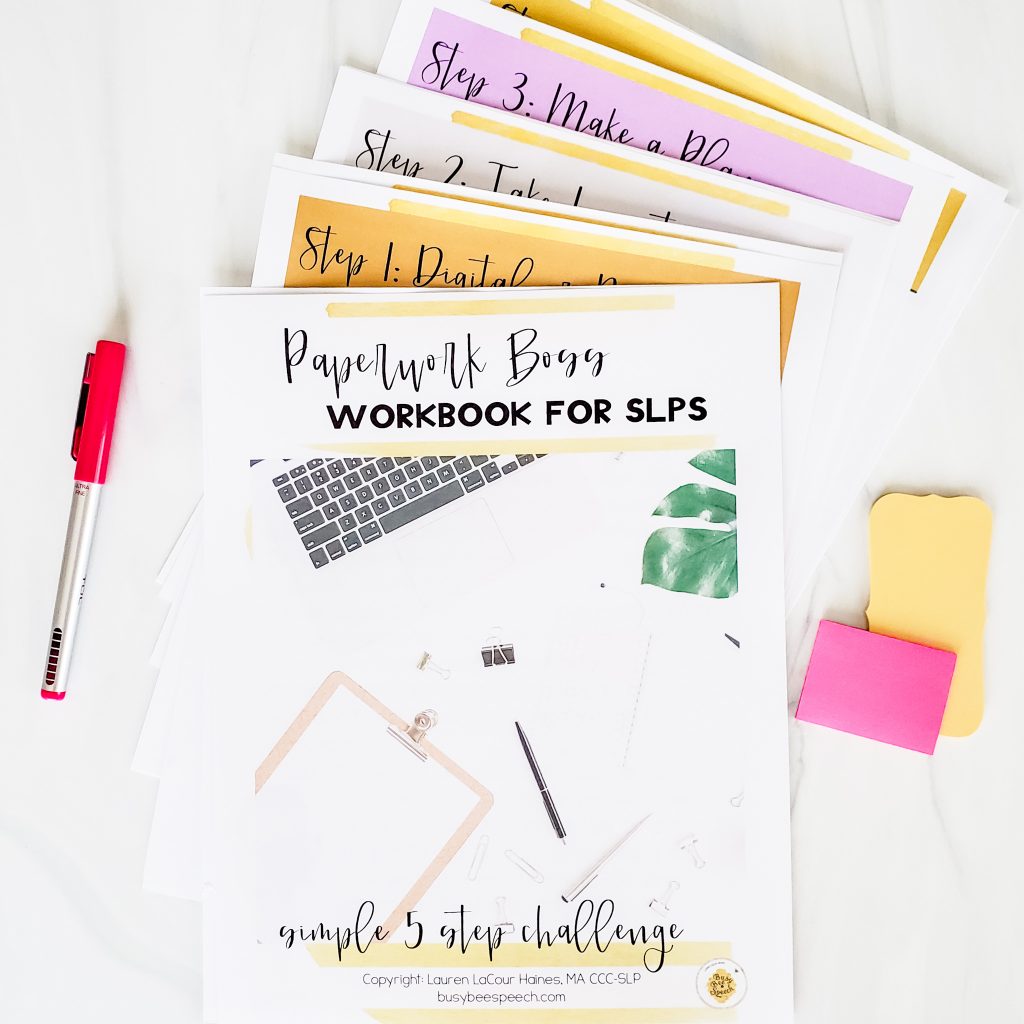
Are you a grad student or CF looking at jobs in the school system? Or maybe you are thinking of switching settings from a medical to a school SLP.
Just like with any job, there are pros and cons. You may have heard of some of them for the school SLP. Here are a few common ones:
When it comes to a job setting, sometimes you want the inside track before saying yes. And although no 2 schools, districts, or systems are alike, I’ve got you. I’m here to let you in on the juicy deets to help you make that decision.
If your grad school program was like mine, you didn’t learn all about the ins and outs of the education system. Hopefully, some of this info can help and cut down your research a little.
Check out this quick guide or overview to working as an SLP in the schools.
Roles and Responsibilities of a School SLP
In a nutshell, our main role as a school-based SLP is to diagnose and treat students with speech and language disorders as it relates to or impacts their education.
This includes:
- Prevention through Response to Intervention (RtI) practices and school initiatives. This could involve working to support students in tier 2 (teacher/group) and tier 3 (individual) interventions. We want to prevent any negative impact that speech or language deficits could have on education.
- Assessment and diagnosis of communication disorders to the extent that it impacts a student’s education. This includes collaborating with other professionals on the team to identify the best programs and placements in the least restrictive environment for the student.
- Designing programs by developing an Individualized Education Program (IEP) specific to the student’s needs. This legal document encompasses the student’s goals, service times, accommodations, and more.
- Intervening, collecting data, and monitoring progress throughout the school year. Progress reports are typically written for each student several times a year.
- Tracking paperwork and meeting deadlines as mandated by the federal, state, and district requirements. This includes things like Medicaid billing, writing reports, keeping tally sheets/therapy logs, and much (much) more.
- Collaborating with other professionals, families, and students to support communication needs and instructional programs at school.
- Advocating for programs that benefit students and increase communication skills. We also want to advocate for our own profession and reasonable workloads.
Each state and district will have specific procedures and requirements for SLPs. It’s important to learn those laws or at least have a reference guide for them. My advice would be to always have an SLP bestie or supervisor to whom you feel comfortable asking your questions.
Because our public school system here in the US educates ALL children, school SLPs work with students exhibiting a full range of communication disorders. I find that it’s hard to specialize or develop expertise in one area of speech or language because our caseloads are constantly changing. We have to be ready for any student with any disorder who walks through the door.
You can read more about the vast responsibilities of a school SLP in this ASHA article. Some of the above info is sourced from that article.
Things No One Tells You
There are also a few things that no one warns you about before working in the public school setting. Here are a few of the things I wish I’d known. I don’t think it would’ve deterred me from working in the schools. I just would like to have been more prepared.
1. Unrealistic expectations
School SLPs are often given expectations that are physically impossible to meet. At least, they’re impossible if you want them done with fidelity. Some districts give SLPs super high caseloads or require a lot of unnecessary paperwork.
Sometimes schedules are crazy hard to figure out. IEPs are being written based on what can fit into your schedule instead of what’s best for the child. The system is far from perfect. Policies and procedures are often put into place based on past lawsuits…or just added protection to cover our butts.
If you can get in touch with another SLP in that district and ask questions, that’d be your best bet! Otherwise, just know that you may have to figure out how to deal with situations that are not easy to change.
2. Constant changes
Speaking of lawsuits, procedures will often change because of one tough situation. IEPs need to be written one way, then suddenly it’s interpreted a different way. You then have to change the way you do everything.
The hard part about it is that you are constantly unlearning old ways and learning new ways. It’s enough to give a girl whiplash.
3. Curriculum mandates and teacher lingo
Procedures change and so do curriculums. I didn’t realize that curriculum could impact my job, but it can. When you have to treat children through the lens of educational impact, the curriculum can influence your student‘s goals and objectives. It can affect how much support a student might need in the classroom and so much more.
The lingo in the education world is something else that made me feel super inadequate when I started working in the schools. There are tons of acronyms and terms that I had no idea what they meant. For example, do you know what PLC, BIP, FBA, OHI, FAPE stand for?
Here’s a helpful website for your reference to help you understand those acronyms. And this is another one. Now when you hear something you don’t know, you can see if it’s on this list.
4. Certain times of the year are harder
The entire school year isn’t crazy. There are actually times where it’s pretty manageable. Don’t judge the whole year by the first 6 weeks. It settles down a little after that.
But don’t get too comfortable either. Once March rolls around, you’ll be flying around your school building again. And it won’t stop until summer comes.
This is a good thing to know. If you can plan for those tough times, it’ll save you LOTS of stress in the long run.
5. You can seriously change lives!
As a school SLP, your job is hard. But let me tell you, it’s so rewarding. The volume of lives you have the opportunity to change is amazing. If you have a caseload average of 50 and you work for 20 years, that’s 1,000 lives you impact.
That’s 1,000 little faces and hearts you have the opportunity to pour into each day. They are better communicators because of you. So, on your worst day remember that. We’re doing it for them.
PAPERWORK BOSS CHALLENGE
If you need some help getting your paperwork in order and coming up with a system that works for YOU, check out my ! This 5-day challenge will help you get a working system in place to tackle all your many SLP jobs and responsibilities.
I hope this quick overview helped, friend! Join me over on Instagram where we’re constantly talking about all things school SLP!

















[…] week! I hope you’ve enjoyed the school-based series this month! We’ve talked all about the many roles and responsibilities that SLPs have. And we even dove into a few things that I wish I would’ve known before […]